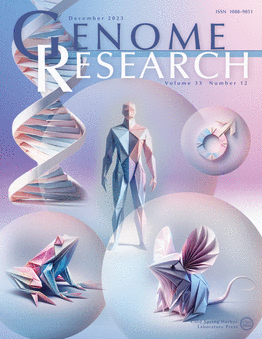Geometric deep learning framework for de novo genome assembly
IF 6.2
2区 生物学
Q1 BIOCHEMISTRY & MOLECULAR BIOLOGY
引用次数: 0
Abstract
The critical stage of every de novo genome assembler is identifying paths in assembly graphs that correspond to the reconstructed genomic sequences. The existing algorithmic methods struggle with this, primarily due to repetitive regions causing complex graph tangles, leading to fragmented assemblies. Here, we introduce GNNome, a framework for path identification based on geometric deep learning that enables training models on assembly graphs without relying on existing assembly strategies. By leveraging only the symmetries inherent to the problem, GNNome reconstructs assemblies from PacBio HiFi reads with contiguity and quality comparable to those of the state-of-the-art tools across several species. With every new genome assembled telomere-to-telomere, the amount of reliable training data at our disposal increases. Combining the straightforward generation of abundant simulated data for diverse genomic structures with the AI approach makes the proposed framework a plausible cornerstone for future work on reconstructing complex genomes with different ploidy and aneuploidy degrees. To facilitate such developments, we make the framework and the best-performing model publicly available, provided as a tool that can directly be used to assemble new haploid genomes.用于从头开始基因组组装的几何深度学习框架
每一个全新基因组装配器的关键阶段都是在装配图中找出与重建的基因组序列相对应的路径。现有的算法方法很难做到这一点,主要原因是重复区域会造成复杂的图形纠结,从而导致组装结果支离破碎。在这里,我们介绍基于几何深度学习的路径识别框架 GNNome,它可以在不依赖现有组装策略的情况下在组装图上训练模型。GNNome 仅利用问题固有的对称性,就能从 PacBio HiFi 读数中重建组装,其连续性和质量可与多个物种的最先进工具相媲美。每组装一个新的端粒到端粒的基因组,我们就能获得更多可靠的训练数据。针对不同基因组结构直接生成大量模拟数据的方法与人工智能方法相结合,使我们提出的框架成为未来重建不同倍性和非整倍体程度的复杂基因组工作的可靠基石。为了促进这种发展,我们公开了该框架和表现最佳的模型,并将其作为一种可直接用于组装新单倍体基因组的工具。
本文章由计算机程序翻译,如有差异,请以英文原文为准。
求助全文
约1分钟内获得全文
求助全文
来源期刊

Genome research
生物-生化与分子生物学
CiteScore
12.40
自引率
1.40%
发文量
140
审稿时长
6 months
期刊介绍:
Launched in 1995, Genome Research is an international, continuously published, peer-reviewed journal that focuses on research that provides novel insights into the genome biology of all organisms, including advances in genomic medicine.
Among the topics considered by the journal are genome structure and function, comparative genomics, molecular evolution, genome-scale quantitative and population genetics, proteomics, epigenomics, and systems biology. The journal also features exciting gene discoveries and reports of cutting-edge computational biology and high-throughput methodologies.
New data in these areas are published as research papers, or methods and resource reports that provide novel information on technologies or tools that will be of interest to a broad readership. Complete data sets are presented electronically on the journal''s web site where appropriate. The journal also provides Reviews, Perspectives, and Insight/Outlook articles, which present commentary on the latest advances published both here and elsewhere, placing such progress in its broader biological context.
 求助内容:
求助内容: 应助结果提醒方式:
应助结果提醒方式:


